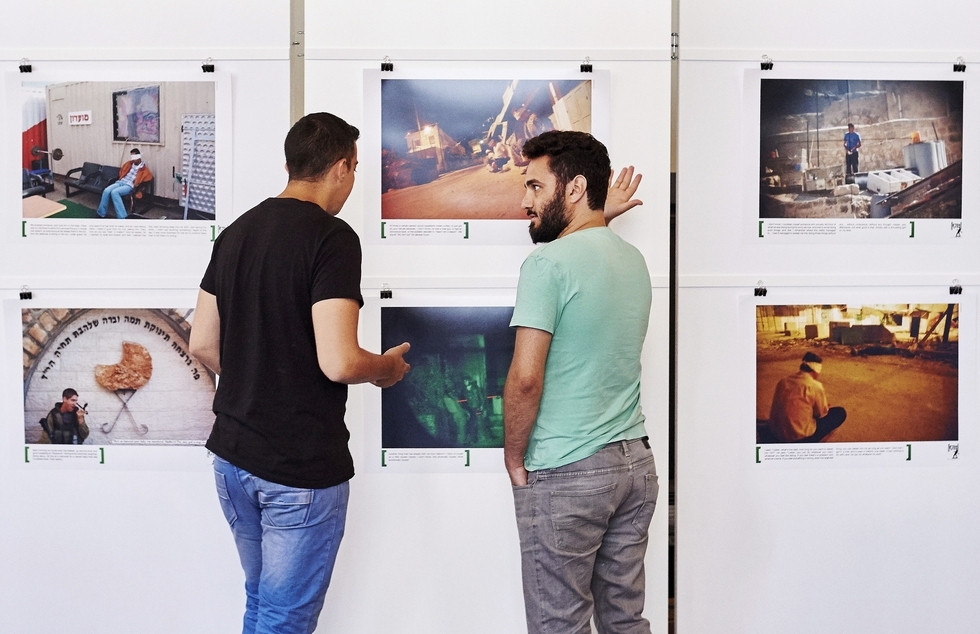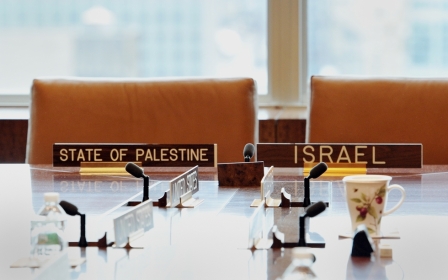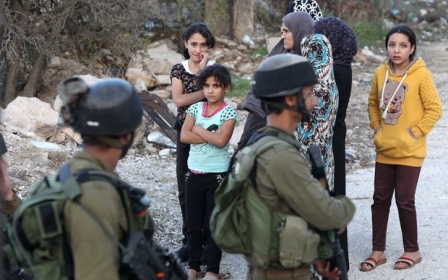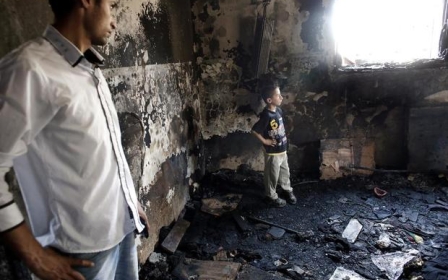Israel: The enemy within

Even veteran members of the Israeli left-wing camp cannot remember when they were last subject to such a concerted, prolonged and vicious assault as the one they have faced in the last few weeks. There were times in which Israel's radical left was smaller, but rarely was it put to such an institutionalised and almost official campaign of delegitimisation.
It began with the "planted" campaign by the right-wing "Im Tirzu" organisation which distributed video clips of prominent Israeli human rights activists depicting them as collaborators of "Palestinian terrorists", financed by foreign governments.
This blatant smear campaign coincided with the bill pushed by Justice Minister Ayelet Shaked demanding that human rights organisation which receive more than half of their funding from foreign governments carry special badges when they deal with Israeli official bodies.
The case of Ezra Nawi, an Israel human rights activist who has dedicated himself to protecting Palestinians living the semi-desert area south of Hebron threatened by the expansion of nearby Israeli settlements, was another step in the same direction.
Nawi was arrested early last week after a prestigious Israeli investigative television programme claimed he caused the deaths of Palestinian land brokers who had tried to purchase land from Palestinian owners in order sell it to Israeli colonists, by handing over their identity to the Palestinian Authority where the penalty for such actions is death.
Although no Palestinian was executed by the PA for more than a decade, on land purchasing or other charges, Nawi was arrested on suspicion of "meeting a foreign agent" and denied access to his lawyer for a week. These charges seem absurd as Israel's security services themselves regularly hand over to the PA names of Palestinians suspected of affiliation to Hamas or conspiring to commit attacks on Israeli targets.
And as if this is not enough, five coalition MPs have this week filed a bill proposing to outlaw Breaking the Silence, an organisation which collects and publishes testimonies of Israeli soldiers on their experiences in the occupied Palestinian territories. If the government supports this proposal, it will almost certainly be passed in parliament.
Clampdown intensifies
A possible outlawing of Breaking the Silence would add to the outlawing of the northern branch of the Islamic Movement in Israel two months ago. In such an atmosphere it was no wonder that most Israeli media was confident that an accidental fire which broke out at the offices of B'tzelem, another leading human right organisation, was premeditated arson. The vapours of fuel are in the air.
Yet the question is why does this attack come now, when the Israeli left is so weak, when it does not seem to pose any serious threat to the right-wing government led by Benyamin Netanyahu?
Israel's centre-left is weak not just in numbers of seats in parliament. It is also divided within itself, with both the Zionist Camp and the Yesh Atid party of Yair Lapid not able to form any united front against this anti-democratic wave, sometimes even competing with each other in criticising these very same organisations under attack.
The international arena seems also favourable to Israel. The Arab world is extremely divided over Syria, ISIS and other issues. Palestinian political parties and factions fail to enlist their people, and Europe and the United States have very little appetite to involve themselves in the area. In his State of the Nation speech, President Barack Obama did not mention Israel and the Palestinians even once. The peace process is virtually dead so there is no real pressure to end occupation.
Twenty years after being elected prime minister for the first time, Netanyahu has managed to "educate" Jewish Israeli society into being less tolerant, more self-centered and more nationalistic and chauvinist. Palestinian violence, for example, is generally taken out of the context of occupation and widely conceived as part of an eternal war in which non-Jews strive to kill Jews only because they are Jews.
Politicians from almost all walks of the political spectrum see that the public has moved to the right, so in order "to feed the beast" they compete in portraying themselves as loyal to the "Israeli cause". They look for an enemy they can feed on.
Yet this has become more difficult. After its deal with the West, Iran has become less of an obvious target. The "individualist" nature of the current wave of Palestinian violence makes these politicians feel impotent as there is no clear Palestinian enemy to strike back against. Just this week Israel received a new state of the art submarine from Germany. But what use does it have in front of 16-year-old Palestinian girls waving scissors in the streets of Jerusalem?
The BDS (boycott, divestment, sanctions) movement against Israel is perhaps failing to achieve tangible results, but its effects are being felt. The European Union is considering a resolution which will sharpen the distinction between products manufactured in Israel and those manufactured in the occupied territories.
Sweden does not hesitate to criticise alleged extra-judicial killing of Palestinians by Israeli security forces and Brazil refused to accept a new Israeli ambassador because of his prominent role in the settler movement.
Easy targets
Israel feels more isolated on the hand and less secure on the other. In such a situation, human rights organisation have become an easy target. Their very activity seems illegitimate because they dispute the assumption that all Palestinians are natural enemies. The information they provide international bodies and media about Israel's actions in the occupied territories is perceived as giving ammunition to those wishing to isolate Israel.
Another element adding to the right wing's anger and frustration is the fact that the Israeli left may be smaller, but its radical wing, represented in these human rights organisations, has become more intransigent.
This new generation does not feel obliged to apologise or retreat, as was sometimes the case with the "old" Israeli left, and continues to defy the Israeli mainstream. The numbers of volunteers in Breaking the Silence has gone dramatically up since the beginning of the media campaign against it.
Israeli politicians seem to think that every attack on these organisation will gain them points in the fight amongst them to appear tough. Although Prime Minister Netanyahu is a little more shy in this respect, Education Minister Naftali Bennett, leader of the Jewish Home party, does not miss a chance to punch them. Ex-foreign minister Avigdor Lieberman, now a member of the opposition, said at the weekend that Breaking the Silence and B'Tzelem are "plain traitors", comparing them to two Israeli Jews who were convicted for espionage.
A leading member of the Labor Party, who preferred to stay anonymous, said this week that this search for an internal enemy, this constant need to "feed the beast", resembles to him the situation in the Weimar Republic in Germany before the rise of the Nazi regime. This maybe an exaggeration, but the feeling of being persecuted is there.
With all its shortcomings, Israel has kept its democratic regime all through the years, at least for its Jewish citizens. Is it heading now towards losing large elements of its democracy? It is clear that such an option is on the table and that it enjoys wide support in the Israeli public.
The question is whether the current government will have the "courage" to break with this democratic tradition and whether the new unapologetic radical left will have the power to reorganise and fight back. Outlawing Breaking the Silence, if implemented, may be a point of no return, a sign that Israel has decided to change course.
- Meron Rapoport is an Israeli journalist and writer, winner of the Napoli International Prize for Journalism for a inquiry about the stealing of olive trees from their Palestinian owners. He is ex-head of the News Department in Haaertz, and now an independent journalist.
The views expressed in this article belong to the author and do not necessarily reflect the editorial policy of Middle East Eye.
Image: Former Israeli army soldiers discuss in front of photographs at an exhibition of the Israeli NGO "Breaking the Silence" at the Kulturhaus Helferei on 3 June 2015 in Zurich (AFP)
Middle East Eye propose une couverture et une analyse indépendantes et incomparables du Moyen-Orient, de l’Afrique du Nord et d’autres régions du monde. Pour en savoir plus sur la reprise de ce contenu et les frais qui s’appliquent, veuillez remplir ce formulaire [en anglais]. Pour en savoir plus sur MEE, cliquez ici [en anglais].





